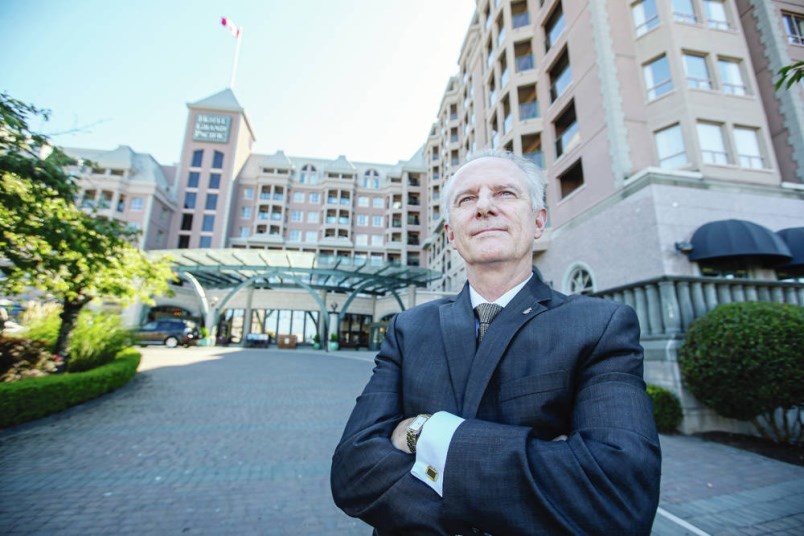Tourism’s great awakening is on — visitors are pouring in, and the streets and harbour are getting lively again.
Fully vaccinated Americans start arriving on Monday by land and air — and likely within a month by ferries and yachts.
But behind the scenes, a labour crisis is brewing in the hospitality industry.
Reid James, general manager of the Hotel Grand Pacific — one of Victoria largest and most prominent hotels — puts it like this: “We can’t sell rooms we can’t clean.”
There’s a shortage of housekeeping staff across the industry, with many flocking to health care and seniors’ homes for more stable employment. And that means only 80% of the Hotel Grand Pacific’s 304 rooms will be available on weekends, and about 50% during the week.
It’s the same for front-desk staff, servers, chefs, cooks, dishwashers and table bussers.
Restaurants and hotels — already at the mercy of unpredictable supply chains and rising prices — are operating at a reduced capacity because of low staffing levels, said Grant Olson, who runs the Strathcona Hotel and entertainment complex with several pubs and restaurants downtown.
While the eateries are open and busy, lineups and wait times are longer and menus reduced and simplified. Fewer cooks mean fewer choices, and fewer servers mean long delays, operators say.
The B.C. Restaurant and Food Services Association estimates about 45,000 workers have been lost since the pandemic began — about 190,000 are needed to operate the province’s restaurants at a normal capacity.
The seismic shift in employment is being traced to several factors, from extended government benefits to apathy, burnout and a preference for more stable employment in sectors not so susceptible to the ups and downs of COVID regulations.
Olson said the industry has paid above B.C.’s minimum wage of $15.20 an hour for some time. Recently, he saw an ad from a restaurant offering dishwashers $23 an hour.
“Many won’t be able to afford higher wages, and just shrink [operations],” said Olson.
He said former restaurant workers are going into construction jobs, the technology sector and busy retailers like Home Depot.
“I don’t know exactly where they’ve all gone … but there isn’t a lot out there,” said Olson. The Strathcona complex normally has about 300 staff this time of year, but is short about 50.
“We’re just strapped all the way around,” he said. “There’s just not an ample supply of humans out there ready to jump on. I’ve placed ads for months, with very little response.”
Victoria’s unemployment is at 5.4%, one of the lowest rates in Canada.
Dan Gunn, chief executive of VIATEC representing Greater Victoria’s technology sector, said it’s likely tech firms are benefiting from the migration of hospitality workers, tapping younger workers who might traditionally work in hotels and kitchens.
“Anecdotally, you hear of lots of workers shifting into tech … they’re not all just coders and engineers. There are opportunities in marketing, communications, administration,” said Gunn. “You hear about it across North America, really. People are re-thinking how they work and what they want to do, and there are tools now where you can work from anywhere.”
The VIATEC job board had more than 100 listings Wednesday, ranging from receptionists and bookkeepers to marketers, sales reps and software engineers.
Ian Tostenson, CEO of the B.C. Restaurant and Food Services Association, said the industry has long been concerned about its dwindling staff base as the baby-boomer generation continues to retire en masse.
Olson said that has many businesses seeking younger staff for front-desk and kitchen work. But that’s easier said than done.
Olson noted some teens who might traditionally have worked in hospitality can make money on social media by writing blogs about gaming or promoting products.
Gunn agreed, saying social media “side hustles” are becoming common.
“There is an opportunity to make a little money creating content or being an influencer,” he said. “In some cases, it’s better than getting a real job.”
Most hospitality operators say it’s been an exhausting run through the pandemic, pivoting constantly to keep their businesses alive and adhering to strict guidelines. Abuse from patrons, mostly verbal, in response to constantly changing pandemic rules has contributed to staff shortages, Olson said.
He said staff have to police table spacing and discourage table hopping. Front-desk workers sometimes get a dressing down for asking someone to wear a mask.
“It’s wearing on people,” said Olson. “Some just say I’ve had enough.”




